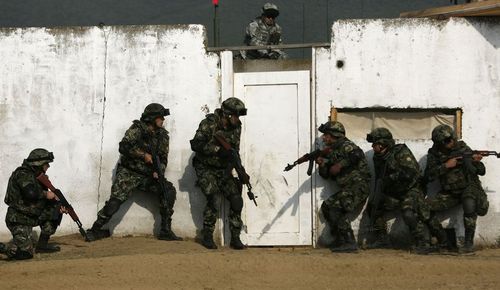 Having assumed the rotating presidency of the SEDM (Southeast Europe Defence Ministerial Process) on 15 July 2009, Bulgaria will hold meetings of the political-military steering committee of the southeast Europe multinational peace force and of the co-ordination committee of SEDM.
Having assumed the rotating presidency of the SEDM (Southeast Europe Defence Ministerial Process) on 15 July 2009, Bulgaria will hold meetings of the political-military steering committee of the southeast Europe multinational peace force and of the co-ordination committee of SEDM.
Attending will be members of the SEDM, in parallel with representatives from Nato’s regional command, as well as the Organisation for Security and Cooperation in Europe (OSCE).
The two-day forum will address security and stability in Southeast Europe, particularly the Balkans. Discussions will be geared towards improving the capability of the multinational brigade, the deployment in Kosovo and the establishment of a Southeast Europe defence ministry.
Meanwhile, as Bulgaria prepares to host the conference, EU defence ministers discussed the capability of the bloc’s rapid reaction force in Gothenburg, Sweden, the Associated Press reported.
Bulgarian Defence Minister Nikolai Mladenov is also attending the conference in which European defence ministers expressed reluctance on September 28 to send reinforcements to the Nato-led mission in Afghanistan. This was a response to a US request for European partners to commit more front-line combat troops to the beleaguered state.
Most EU countries have said they would rather allocate resources towards training the Afghan military and police, rather than commit troops. More than 40 countries have sent troops to Afghanistan under the Nato banner with Britain, Germany, France, Italy and Poland providing the most. Bulgaria has also deployed a battalion to the country.
“I can’t deliver more than what we have now,” Dutch defence minister Eimert Van Middelkopp was quoted as saying by Reuters. “We have a lot, about 2000 men in Afghanistan. I think it’s far more important in the long run that we have more Afghan military, and Afghan police.”
“If you look at Europe, I don’t hear any voices saying we have an additional five or 10 000 soldiers to send to Afghanistan,” Danish defence minister Soren Gade told Radio Free Europe. “Take my country, for example,” he said. “Right now, we have 850 soldiers [in Afghanistan]. Compared to our size (five million people) it’s a lot, so it will be very difficult for me to send more soldiers and I think a lot of European politicians will have an excuse not to do so.”
 Eurasia Press & News
Eurasia Press & News
